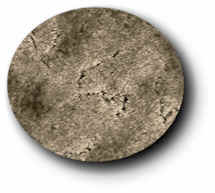How To Choose New Flooring Like A Pro!
Carpet | Pad | Installation | LVP | Forms | Best Dealers
Best Carpet For Stairs?
Carpet On Stairs Get the Most Abuse. It’s because stairs are narrow and receive a constant pounding from foot-traffic focused right down the center and along the front leading-edge of every step.
Active children, dogs and cats and especially teenage boys and all their friends are one main reason why carpets installed on stairs tend to wear out much faster than other carpet installed in your home.
Kids and pets love to run up and down the stairs as fast as they can which is very damaging to the pile surface. Abrasion is the number one cause of carpet wear and tear.
How to Reduce Wear & Tear on Stairs?
To start with, you can choose a more durable "Grade of Carpet" that can better handle moderate to heavy foot-traffic.
Selecting a padding with a lower height and a higher-density rating will provide better support for your carpet installed on stairs.
Here are a few style and fiber options that may help you choose the right grade and style of carpet and padding for your stairs and other high-traffic areas.
The Best Carpet Fiber for Stairs?
|
|
For stairs, you can choose almost any carpet style you like as long as the "grade of carpet" is designed to handle your level of foot traffic. The most durable residential carpets are made from Nylon.
There are various types of Nylon fibers available and some are more durable than others. The “soft” Nylon styles are not quite as durable as the standard Nylon carpet styles.
What Are Carpet Grades?
Carpet specifications determine the grade of the carpet you select. That means fiber type, tuft twist, pile height, pile density and face weight.
Choosing the Right Carpet Fiber for Stairs
The Carpet Fiber you select will determine how long it lasts, how soft it feels, what colors are available, how easily it cleans and how much it costs.
This is one of the most critical factors homeowners face when choosing and comparing carpet.
There are several carpet fibers available today and they all have their own unique benefits and pitfalls:
-
Nylon - Two main versions are Stainmaster 6.6 and Anso 6.0 and available in various "soft" styles.
-
Sorona - also known as Triexta; Smartstrand; and PTT.
-
P.E.T. Polyester - This is a soft and stain resistant fiber made from recycled plastic bottles.
-
Polyester - A soft and yet inexpensive fiber to manufacture which makes it popular for homeowners who are on a budget.
-
Olefin - Also known as polypropylene. A durable fiber that is inexpensive to manufacture but difficult to clean.
-
Wool - A soft and natural fiber derived from sheep, is naturally fire-resistant but very expensive to buy and more costly to install and maintain.
Carpet Comparison
|
|
You can't compare NYLON to a POLYESTER or an OLEFIN. This would be like comparing apples to oranges.
You have to compare similar carpets and narrow it down to the one that best meets your needs and lifestyle as well as your budget.
Don't believe any salesperson that says a Polyester carpet is just as durable as a Nylon carpet. Nylon is the most durable fiber. Polyester doesn't even come close.
So if you want your new carpet to tolerate heavy foot-traffic and continue to look like-new for years to come, then nylon is the clear choice.
Print up a few of my free Carpet Shopping Forms to help narrow down your final choices.
Nylon Is Most Resilient
Nylon is a generic name or designation for a family of synthetic polymers first produced in 1935 by the DuPont Company. As far as fibers go, Nylon is the most durable and the most resilient of all fibers.
A "resilient" fiber is defined as having the ability to return to its original form or position after being bent, compressed, or stretched.
Resiliency is what keeps Nylon carpet looking like-new longer than any other fiber. I would consider choosing a Nylon style with heavy foot traffic and longevity was my biggest concern.
Q.
Are "softer" nylon styles as durable as standard nylon styles?
This is an excellent question. From my experience, I have found that the
"softer" Nylon fibers are not NEARLY as resilient as a standard denier
Nylon fiber.
The thicker the fiber denier, the heavier the filament, the more durable the carpet will be!
To make a fiber softer is to make the strand thinner. By doing so, I firmly believe that a lot of the fiber resiliency is compromised.
This thinner strand creates a carpet that is much more softer to the touch but as a result may be more susceptible to matting and crushing of the pile.
I'm not steering you away from buying a soft nylon style, but if you want to have the absolute most durable and most resilient nylon for the money, I suggest you buy a carpet made with a standard denier Nylon fiber.
What is Fiber Denier?
Denier is the measurement of the strand diameter. Fiber denier is easily understood for those who gone fishing and used a nylon filament fishing line. The thicker the line is, the stronger it is.
For example, when fishing for Trout, fishermen may use a thin 4-pound test line. For bigger fish like Steelhead or Salmon, a thicker 6, 8 or 10-pound nylon test line may be used.
Denier is the measurement of the diameter of the extruded strand.
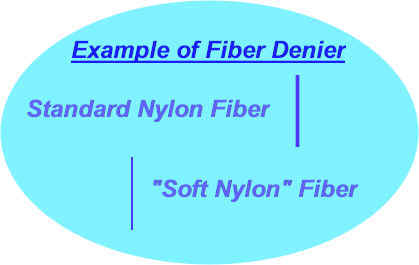 Some carpet fibers are
purposely manufactured thinner to make a carpet that
feels softer to the touch, but in doing so some of the strength, durability or
resiliency may be sacrificed.
Some carpet fibers are
purposely manufactured thinner to make a carpet that
feels softer to the touch, but in doing so some of the strength, durability or
resiliency may be sacrificed.
A carpet made with a standard (heavier) denier nylon fiber will be more durable and more resilient than a carpet made from a thinner strand in today's branded "soft nylon styles".
Sorona® or PTT
(aka Smartstrand by Mohawk™)
If you want a carpet that is durable, soft and resists stains, Sorona may be the fiber you are looking for.
Sorona has excellent stain resistance. But remember, no carpet is completely stain proof. Sorona® also known as Triexta or PTT was developed by DuPont™.
It is a polymer derived from corn. It is said to have the best anti-stain properties and cleans easier than any other fiber. They also say it is very durable. Sorona™ is clearly more durable than PET or Polyester, but is it as durable as Nylon? I don't think so.
I do believe that Sorona may resists stains and clean a little bit easier than Nylon, but the durability and resiliency of Nylon is hard to beat. Either way, Sorona may be the fiber you need for your busy home and lifestyle when stain resistance is the utmost priority.
Sorona® Not a New Fiber
Triexta, or PTT was actually invented back in the 1940's but was deemed too expensive to manufacture at that time to be able to compete with other carpet fibers like Nylon.
Carpet prices have increased enough over the past 20 years to allow Sorona™ to be manufactured at a comparable cost.
Mohawk™ has a line of carpet styles using the Sorona fiber and they have branded it and call it Smartstrand®. Dupont™ and Sorona® are a trademark and a registered trademark of E.I. DuPont de Nemours and Company.
Polyester and P.E.T.
Buyer Beware: Carpets made of Polyester or PET Polyester! Polyester is one of the least-costly fibers to manufacture...
A thick polyester carpet may look nice and feel super soft to your hand, but the polyester fiber is not very resilient and it does not a make a durable long-lasting carpet.
Polyester carpets tend to mat down quickly, and that has always been the main problem with carpets made from this fiber. Once Polyester fibers are crushed, they don't spring back to their original upright position.
This is why most new carpet warranties for polyester carpets do not cover ANY claims against matting or crushing of the pile.
Olefin Berber Styles
(also called Polypropylene)
Olefin is a very strong fiber. It is often used to make Berber carpet styles, commercial carpets and outdoor grass carpets. It wears well and has fair stain resistance when an anti-stain treatment is applied.
Olefin also has good anti-static properties. However, inexpensive Berbers made of Olefin are not as easy to keep clean and tend to look dingy when soiled.
Olefin also has poor resiliency so smaller-looped Berber styles tend to tolerate wear much better than do larger-looped Berber styles.
Going Commercial
Commercial looped styles made of Olefin (polypropylene) wear very well, as the loops tend to be very small which leaves little room for the loops to become matted or crushed.
Commercial grade cut pile styles are also very durable. There are no loops and the weave is very tight which helps prevent matting and crushing of the pile.
Wheelchairs roll easily over commercial grade carpets that are glued-down without padding, and may be a good choice for handicapped areas, hospitals and retirement home applications.
When comparing looped Berber carpets made of Olefin, choosing a style with smaller loops and a tighter weave will yield a more durable carpet.
World's Most Popular Carpet Styles?
Q. Which Carpet Style Should I Choose?
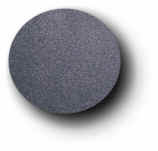 PLUSH
STYLES
PLUSH
STYLES
Plush style carpeting is usually made from one solid color and has a smooth, flat pile surface.
During manufacturing, the tufts of this type of carpet are sheared to make the pile surface perfectly flat and smooth.
Plush is one of the most popular carpet styles used in homes and apartments today. You can find practically any color imaginable.
When made of nylon this type of carpet cleans easily and is very durable if properly maintained.
Plush style carpets will show footprints and vacuum marks.
You can choose Nylon, Smartstrand or P.E.T polyester, or polyester fibers with this popular carpet style. What FIBER Should I Choose?
TEXTURED PLUSH STYLES
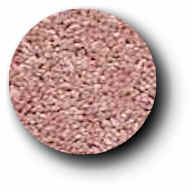 Textured
Plush style carpet often has more than one color of yarn and has varying tuft
height, thus reducing footprint and vacuum marks.
Textured
Plush style carpet often has more than one color of yarn and has varying tuft
height, thus reducing footprint and vacuum marks.
It comes in many colors and has about the same cost as an even pile height plush style.
This is a good carpet for kids, and when treated with a anti-stain chemical is easy to maintain and spot clean. Textured Plush style carpets will show footprints and vacuum marks.
You can choose Nylon, Smartstrand or P.E.T polyester, or polyester fibers with this popular carpet style.
High-Low Styles (Sculptured Styles)
Hi-Low style carpets have both cut and looped tufts creating a multi-colored sculptured appearance.
Generally this style is made with a high cut-pile fiber and a low loop-pile tuft with a variegated design. This style of carpet hides stains and dirt better than most carpet styles.
This popular carpet style is usually made using two or more colors to help hide dirt and show less vacuum marks and footprints. The color usually varies in shade from light to dark and is rich in appearance.
Landlords like using this style of carpet in apartments and rental properties as it hides dirt well and is very durable when made of nylon.
FRIEZE STYLES (my favorite)
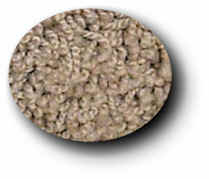 Frieze
style carpets have very tightly twisted tufts which helps it wear like iron.
Frieze
style carpets have very tightly twisted tufts which helps it wear like iron.
The tufts are not straight like a plush style, rather they are crooked, or wiggly in appearance.
I think it makes any room look elegant. It is often used in heavy traffic areas and provides reduced footprint and vacuum marks.
Frieze carpet styles made from nylon are some of the most durable carpet styles available today.
Frieze styles are typically more expensive than plush or textured plush styles. Nylon Frieze styles would be a smart and highly durable option for your home.
This style is also found made from Smartstrand and Polyester although I always recommend choosing nylon.
SAXONY STYLES
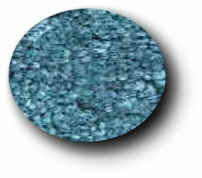 Saxony
is a cut pile carpet with a relatively dense erect tuft configuration.
Saxony
is a cut pile carpet with a relatively dense erect tuft configuration.
Saxony has well-defined individual tuft tips, this means it is easy to see each tuft on the surface of the carpet, giving it a rougher look or appearance. Similar to a plush style.
LOOPED BERBERS
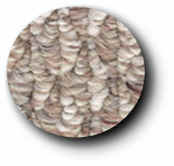 Looped
Berber Styles have become quite popular in recent years because of its elegant appearance.
Looped
Berber Styles have become quite popular in recent years because of its elegant appearance.
With some styles the tufts are looped and aligned in rows for a clean uniform look. In other Berber styles there may be a pattern.
When choosing this carpet be sure to select one with smaller loops to get the best wear. Large-looped Berbers tend to collapse quickly and look worn-out sooner.
Looped Berber styles may be prone to snags which is difficult to repair. For this reason those with small children or active pets my want to avoid a looped Berber style.
More about Berber Carpet Styles
CUT-PILE BERBERS aka "California Berber"
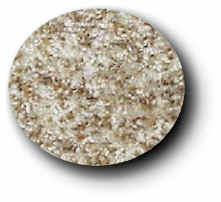 The
"California Berber" style is not a looped Berber like most of you have seen, in fact it is
more like a frieze.
The
"California Berber" style is not a looped Berber like most of you have seen, in fact it is
more like a frieze.
It does not have any loops because the loops have been cut which is why they call it a "Cut-Pile" Berber.
It has a similar appearance of a Frieze style carpet but has a multicolored appearance, a speckled egg appearance.
Usually the main color is off white (or a lighter shade) with colorful highlights and flecks of deep blues, reds and green colors throughout. Beautiful!
Buying a Cut-Pile Berber style made of Nylon is the best way to go if you want it to last longer.
Commercial
"Cut
and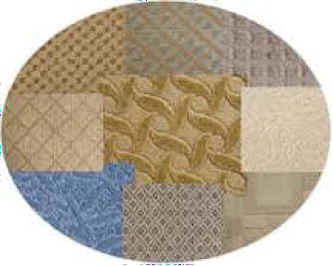 Loop" Carpet Styles
Loop" Carpet Styles
"Cut and Loop" is another wonderful style to consider. It has loops and cut pile combined.
There are literally thousands of beautiful patterns to choose from and it makes for a beautiful and elegant carpet in any residential setting.
Installing commercial grade carpet on stairs is a great way to go. Here is a collage of "Cut and Loop" styles to give you an example of a few patterns that may be available.
This is just the tip of the iceberg when it comes to available carpet styles today.
Learn more:

